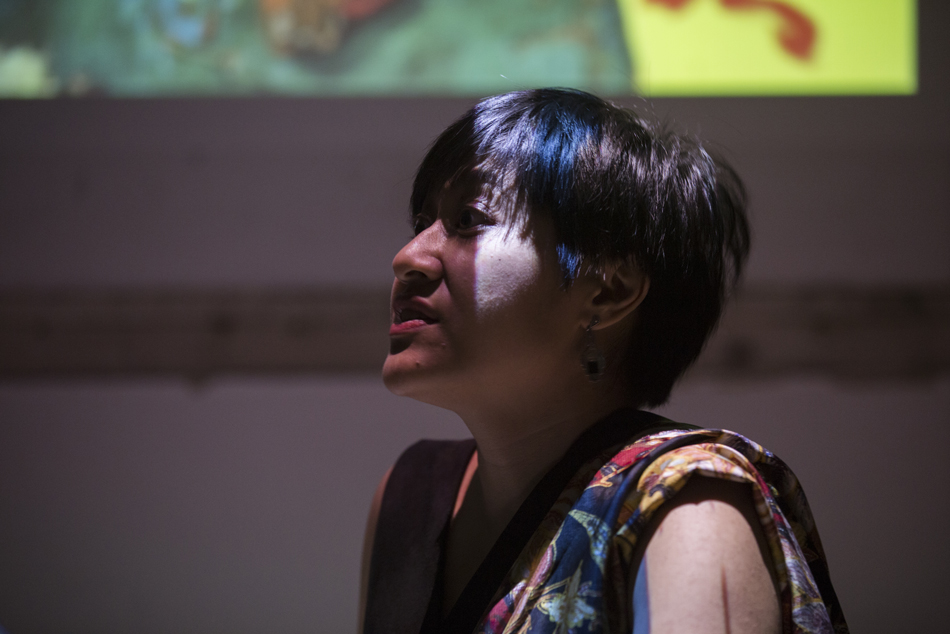Content warning for discussions of sexual abuse, child abuse, child pornography, racism and ableism.

This episode was actually recorded in early May, and here it is over four months later, FINALLY seeing the light of day, and I’m so delighted because Okka–poet, writer, and artist–is a goddamn delight. But don’t just take my word for it. Listen for yourself, and then check out some of these exciting and also very extensive links:
- First off, you should definitely check out all of Okka’s work, including Rope, Indigenous Species, Stairs and Whispers: D/deaf and Disabled Poets Write Back, and her performance Annah: Nomenclature.
- You can also find her work in issue 24 of Uncanny Magazine, “Disabled People Destroy Science Fiction”!
- And here’s Katie Lewis Hood’s splendid review of Indigenous Species!
- The conference that had Okka in town was HASTAC 2019, “Decolonizing Technologies, Reprogramming Education”
- Okka mentioned the 2016 conference Archives Matter: Queer, Feminist and Decolonial Encounters
- I talk quite a lot in this episode about Lily Cho‘s remarkable research project Mass Capture (and gosh I hope I don’t misrepresent it!)
- Oh gosh, and we talk a lot about French painter Paul Gauguin, particularly his painted Annah the Javanese. Okka references the books Paul Gaugain: An Erotic Life and The Way to Paradise as well as the biopics The Wolf at the Door and Paradise Found, starring Donald and Kiefer Sutherland, respectively.
- You can learn more about the Dutch East India Company here!
- We discuss the incredible work of Lydia X. Z. Brown (apologies for getting their middle initial wrong!), the episode of Witch, Please we recorded with them, as well as Rowling’s article on “Illness and Disability” in the wizarding world.
- We also talk about environmental racism, the over-harvesting of white sage, and how white witches appropriate Indigenous practices.
- And finally, here are all of the books that I caught references to:
- Tina M. Campt, Listening to Images
- Saidiya Hartman, Wayward Lives, Beautiful Experiments: Intimate Histories of Social Upheaval
- Ann Laura Stoler, Race and the Education of Desire: Foucault’s History of Sexuality and the Colonial Order of Things and Along the Archival Grain: Epistemic Anxieties and Colonial Common Sense
- Slamet Thohari, Disability In Java: Contesting Conceptions of Disability In Javanese Society after the Suharto Regime
- Leah Lakshmi Piepzna-Samarasinha, Care Work: Dreaming Disability Justice
- Jasbir K. Puar, The Right to Maim: Debility, Capacity, Disability
- Mel Y. Chen, Animacies: Biopolitics, Racial Mattering, and Queer Affect
- Simone Brown, Dark Matters: On the Surveillance of Blackness
- Sara Ahmed, Living a Feminist Life
- Safiya U. Noble, Algorithms of Oppression: How Search Engines Reinforce Racism
- Robert McRuer, Crip Theory: Cultural Signs of Queerness and Disability
- Tobin Siebers, Disability Theory
The podcast theme song is “Mesh Shirt” by Mom Jeans off their album “Chub Rub.” Listen to the whole album here or learn more about them here. Okka’s theme song was “Sparkly” by Young Magic.
Secret Feminist Agenda is recorded and produced by Hannah McGregor on the traditional and unceded territories of the Squamish, Musqueam, and Tsleil-Waututh First Nations.
This episode was amazing. You two absolutely should talk for six hours and record it! I really enjoyed how excited and generous you both were in conversation. I loved learning a bit about archive theory (I’ll definitely be mulling over the storytelling/logic of the archive) and I always love discussions on disability studies. And there was a poem! I’m so excited to go find Okka’s work. Thank you both so much!
LikeLike
Thanks for another fascinating episode! I was so happy to learn about Okka’s work, hear her A+ laugh, etc. Wondering if you & your readers might like to check out a paper by Gracen Brilmyer, “Archival assemblages: applying disability studies’ political/relational model to archival description.” They’re one of the first scholars I’ve seen explicitly address archival praxis through a disability studies lens. Archivists and archival studies people writing about bodies x affects x archives also get at the I-think-related idea of bodies that don’t “fit” in archives, whether that means shapes, abilities, queerness, color, and/or (my favorite) all of the above wrapped up in shitty labor practices. The next issue of Journal of Critical Library and Information Studies is going to dig into this, and it’s OA so hopefully non-academics can get at it too.
(sorry if this posts twice, hit the back button by accident)
LikeLike
This is awesome! Thanks for sharing!
LikeLike